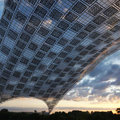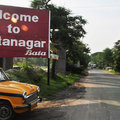News
01 February 2018
The role of stations in future metropolitan areas
What will the role and function of the station of the future be? The Delft Initiative for Mobility and Infrastructure (DIMI) awarded a € 87.500,- research grant to Manuela Triggianese and Roberto Cavallo to research possible answers to this question in a cross-disciplinary program.
01 February 2018
Connecting landscape architecture to the Artefact during IABR2018+2020

In 2018 and 2020 the International Architecture Biennale Rotterdam (IABR) has a combined programme: the Missing Link.
01 February 2018
The legacy of industrial offshoring

The audio documentary ‘Off:Re:Onshore’ engages the effects of industrial offshoring through a series of interviews with eight leaders, activitists, architects, and cultural producers.
01 February 2018
Two Marie Curie Individual Fellow grants awarded

Two researchers of the Chair of Methods & Analysis have been awarded with Marie Curie Invididual Fellow grants for their research proposals with Tom Avermaete.
18 January 2018
BK at UN Habitat in Kuala Lumpur
Both Design as Politics and Urban Thinkers Campus are invited to speak at the upcoming UN Habitat Conference in Kuala Lumpur.
18 January 2018
Work, body, leisure
The Dutch Pavilion at the 2018 Venice Biennale will be a collective installation with a diverse Extended Program. Amongst others, BK City staff Víctor Muñoz Sanz (Urbanism) will be part of the pavilion, presenting an installation together with Marten Kuijpers.
18 January 2018
BK alumna selected to attend 5-day workshop by Norman Foster Foundation
BK Alumni Nadia Remmerswaal was granted by the Norman Foster Foundation to attend the Digital X Atelier in Madrid. The Digital X Atelier is a 5-day workshop for which only 10 (former) students have been selected.
18 January 2018
The building of the future will no longer need doors

The architecture of the future will not be static, but will respond to its users and the environment. Interactive design methods will make this possible, says doctoral candidate Jia-Rey Chang. In his research, 'HyperCells' serve as the building blocks for an organic architecture that is continually transforming.